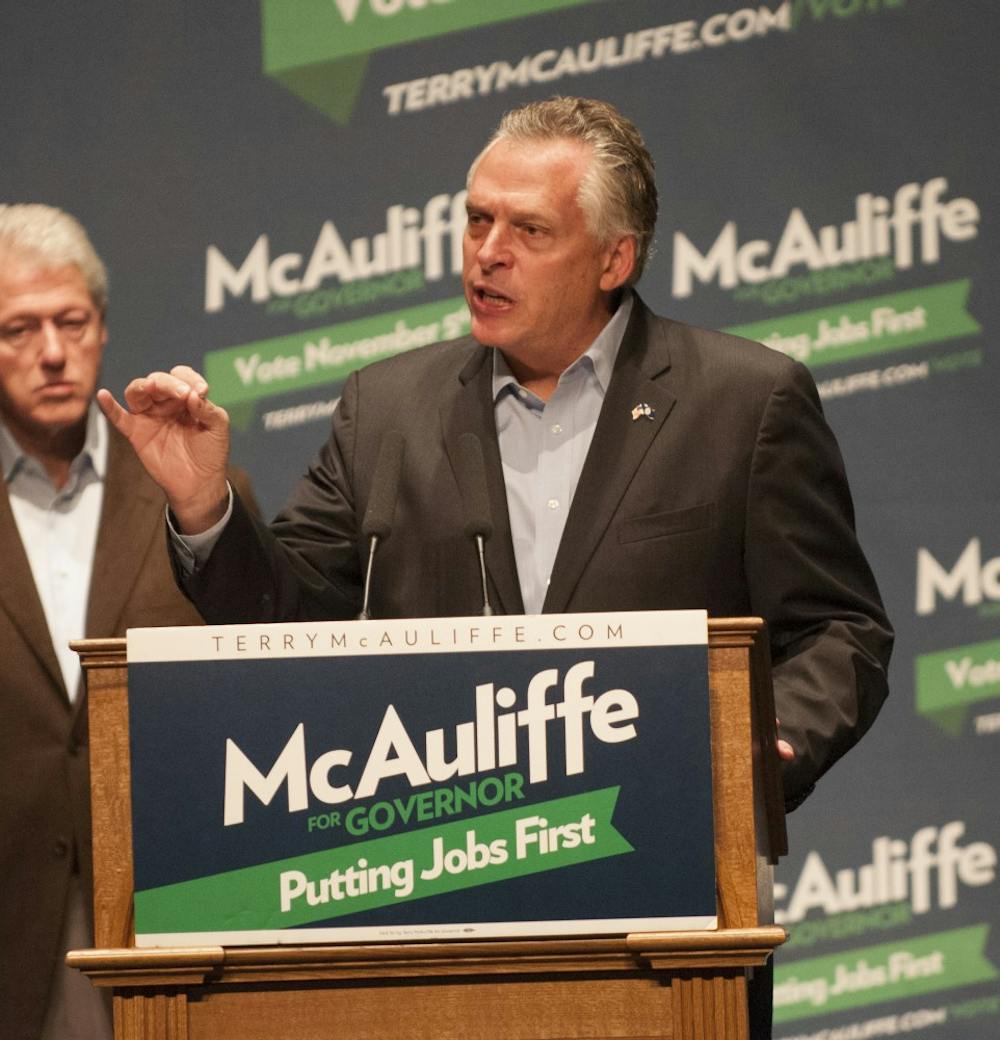In an effort to improve Virginia’s image in the wake of the recent corruption scandal involving former Gov. Bob McDonnell, Virginia Gov. Terry McAuliffe held a press conference Thursday to discuss the importance of ethics reforms.
There, McAuliffe announced the signing of Executive Order 28, which establishes the Governor’s Commission to Ensure Integrity and Public Confidence in State Government.
Former Democratic U.S. Representative Rick Boucher and former Republican Lt. Gov. Bill Bolling will lead the 10-member bipartisan commission. Other commission members include former University President John Casteen III, Hampden-Sydney President Christopher Howard and retired BB&T President John Sherman, Jr.
“They are pragmatists and problem-solvers,” McAuliffe said at the press conference. “Most important, they are individuals with the highest credibility and integrity. I selected this group because of their thoughtfulness, their dedication to solving the problems that we face and, most importantly, their record of getting things done.”
McAuliffe said he is asking the commission to dig deep into underlying issues which destabilize governmental institutions and leave them vulnerable to corruption.
“I am asking my commission to review existing rules on gifts and to recommend changes, including stronger rules on tangible and intangible gifts,” McAuliffe said. “We should not treat different personal financial benefits differently just because a lobbyist offered a public official a free vacation instead of an equally expensive but more tangible item.”
McAuliffe said he wants the commission to improve Virginia’s ethical standing by considering tough questions, such as the best way to ensure judges of high merit and quality are on the bench and whether Virginia needs stronger rules on political contributions and fundraising.
Virginia Speaker of the House William Howell, R-Stafford, and Virginia Senate Majority Leader Thomas Norment, R-James City, issued a statement following the press conference stating their approval of the newly created commission.
“We hold those appointed to lead this commission in high regard and appreciate their willingness to serve the commonwealth,” the statement read. “The General Assembly looks forward to reviewing the Commission’s findings when it completes its work. Ultimately, the responsibility to make changes to Virginia’s ethics, transparency, and disclosure laws rests with the General Assembly. We know legislators in both chambers and in both parties are resolved to doing what is right for Virginia and committed to restoring the people’s trust in their government.”
Virginia received an ‘F’ as an overall rating in a 2012 report issued by the State Integrity Investigation, a collaborative project of the Center for Public Integrity. The commonwealth is ranked 47th out of the 50 states in terms of ethics by the center, with only Wyoming, South Dakota and Georgia ranking lower.
The report rates each state in 14 individual categories and then gives an overall grade to each. Virginia received Fs in nine of the 14 individual categories, including executive accountability, lobbying disclosure and ethics enforcement agencies.
According to a report by State Integrity Investigation Reporter Laura LaFay, Virginia’s low ethics score is due in part to its lack of a statewide ethics commission, along with only nine other states. Virginia is one of only four states with no campaign finance limits and one of two states where part-time legislatures handpick judges.
In addition, while Virginia requires that all campaign donations more than $100 be disclosed, the state does not set a cap on total donations, LaFay’s report said.
McAuliffe recognized this report in Thursday’s press conference, reinforcing that the newly-created commission will help address issues raised in the report.
“It’s one of many warnings the state has received about its mediocre record on accountability and transparency,” he said. “Why? One reason: Our ethics laws have no teeth. If Virginia is going to be a national leader in attracting businesses and creating jobs, we need to be a national leader on transparent, accountable and well-run government.”
Since taking office in January, McAuliffe has already enacted other legislation to improve state ethical standards, such as placing a $100 limits on gifts to himself, his family and his staff.
State legislative leaders have also been taking steps to improve transparency within government. In March, the General Assembly enacted legislation which placed stricter controls on gifts, strengthened disclosure requirements, increased oversight by creating an independent advisory council and mandated ethics training for elected officials.
In May, the legislature passed a bipartisan ethics reform bill — though McAuliffe vetoed it, saying it did not go far enough.
“Accordingly, we have already begun working on additional reforms that will build upon the bipartisan ethics reform package that secured unanimous approval earlier this year,” Howell and Norment said in their statement. “This is a process that will continue as we move forward.”
The commission plans to have a package of ethics reforms ready to propose by late December, before the upcoming 2015 General Assembly session. Plans regarding more complex issues, such as redistricting, will be ready in time for the 2016 session.







